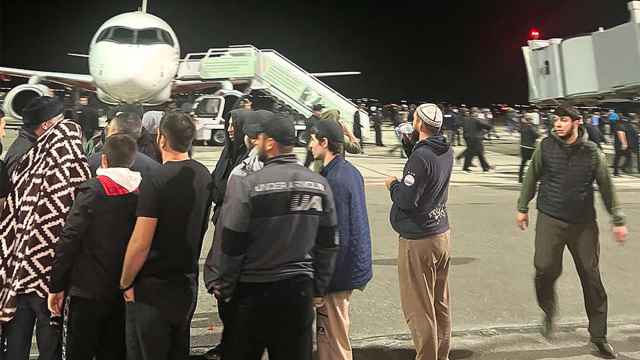President-elect Vladimir Putin said Thursday that he opposed a boycott of the Euro 2012 football championship in Ukraine, even as more top officials announced that they would skip over concerns about the health of jailed former Prime Minister Yulia Tymoshenko.
"One must not in any circumstances mix politics, business and other questions of this sort with sports," Putin said.
He also said Russia would be willing to allow Tymoshenko to come for medical treatment if she and Ukrainian authorities agreed to it.
European Union President Herman Van Rompuy, meanwhile, announced Thursday that he would not travel to any of the matches in Ukraine, joining other top officials such as the European Commission's president, Jose Manuel Barroso, and the governments of Austria and Belgium.
The decisions have come as a blow to a country that had hoped the football championship would showcase it and boost its ties with the EU.
German Chancellor Angela Merkel said she had not yet decided whether to stay away from the matches to be held in Ukraine and that her priority now was Tymoshenko's health.
"Much more important than my travel plans is that we must now do everything possible to see that Yulia Tymoshenko gets the proper treatment for her medical problems as soon as possible," Merkel was quoted as saying by the KЪlner Stadt-Anzeiger newspaper.
"The German government has been working on this for weeks, and our offer stands for her to receive this medical treatment in Germany."
In Warsaw, however, Polish Prime Minister Donald Tusk said that while he is disturbed by Ukraine's treatment of Tymoshenko and is urging Ukraine to observe human rights standards, he does not plan on supporting a boycott of the June 8-July 1 Euro 2012 tournament, which is being co-hosted by Poland.
"I have appealed multiple times to the authorities in Ukraine not to let politics ruin this national celebration, and nothing will affect our determination to fight for human rights and alleviate the situation of Yulia Tymoshenko," he told reporters.
Tymoshenko, 51, is on a hunger strike to protest alleged mistreatment in a Ukrainian prison where she is serving a seven-year sentence on charges of abusing her powers while prime minister.
She claims guards punched her and twisted her arms and legs while forcibly taking her to a hospital to be treated for debilitating back pain.
A Message from The Moscow Times:
Dear readers,
We are facing unprecedented challenges. Russia's Prosecutor General's Office has designated The Moscow Times as an "undesirable" organization, criminalizing our work and putting our staff at risk of prosecution. This follows our earlier unjust labeling as a "foreign agent."
These actions are direct attempts to silence independent journalism in Russia. The authorities claim our work "discredits the decisions of the Russian leadership." We see things differently: we strive to provide accurate, unbiased reporting on Russia.
We, the journalists of The Moscow Times, refuse to be silenced. But to continue our work, we need your help.
Your support, no matter how small, makes a world of difference. If you can, please support us monthly starting from just $2. It's quick to set up, and every contribution makes a significant impact.
By supporting The Moscow Times, you're defending open, independent journalism in the face of repression. Thank you for standing with us.
Remind me later.





